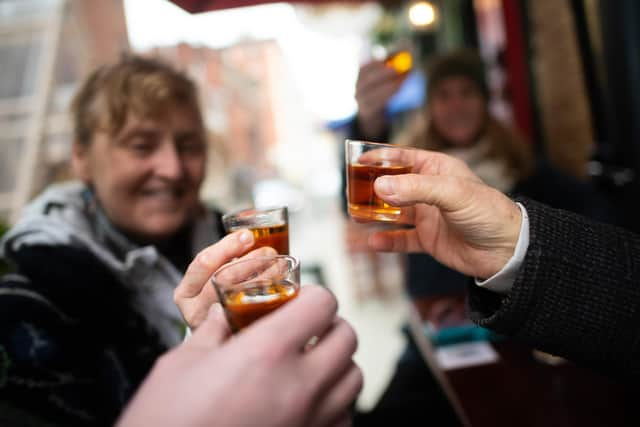Scotland's alcohol advertising restrictions won't hurt the economy and could save lives – Aveek Bhattacharya
Saving lives versus supporting the economy. Health versus wealth. Certainly, that is the way SNP leadership candidate Kate Forbes seems to see it, suggesting that the measures could “undermine one of Scotland’s greatest exports... namely whisky”. Yet that is not, in fact, the trade-off that the government must make. The mooted policies are unlikely to have much of an effect on the Scottish economy – and might even be good for it.
For now, the decision before the Scottish Government is whether to ban or restrict alcohol companies from sponsoring sports and other events, as well as advertising in the media and in public spaces, and also whether to regulate the content of such marketing. Such measures are difficult to evaluate, but there is some evidence to suggest that they can be effective.
Advertisement
Hide AdAdvertisement
Hide AdFor example, a complete ban on alcohol advertising in Norway in 1975 is estimated to have reduced alcohol sales by around seven per cent. Scotland has made significant progress in curbing alcohol harm in recent years. At the turn of the century, the country’s alcohol-specific death rate was three times that of England’s. Today, it is ‘only’ 60 per cent higher. But with harmful drinking spiking again during the Covid pandemic, it is understandable that the government is being urged to do more.
Alcohol producers and marketers do not like the plan, unsurprisingly framing it – as Forbes has done – as an assault on one of Scotland’s most potent symbols and significant economic success stories: the whisky industry. Hiding behind whisky is a familiar tactic. It was the Scotch Whisky Association which led the legal challenge to the Scottish Government’s policy of minimum unit pricing for alcohol, even though hardly any of its members’ products are sold cheaply enough to be affected by the measure.
The prominence and deference given to Scotch whisky in the policy have some economic rationale behind it. Spirits – primarily whisky – help Scotland pay its way in the world, generating nearly £5 billion in exports. That’s around 15 per cent of all Scottish exports outside the UK.
But that’s just the point. Scotch whisky is, by and large, a product made in Scotland for other people to drink. Some 99 per cent of all whisky production ends up outside the country. And Scots drink considerably more wine and beer than whisky. It isn’t even the nation’s spirit of choice – that would be vodka. It is hard to see how the whisky industry will be much affected by marketing restrictions in Scotland when its domestic market accounts for such a tiny share of its business.
It is the other part of the Scottish alcohol economy – the domestic market – that is more vulnerable to the proposed regulations. It generates less income than whisky, £3.6 billion, but employs a lot more people (and, perhaps consequently, pays them quite a bit less). Two-thirds of the 60,000 jobs dependent on the alcohol industry in Scotland are in hospitality – such as pubs, bars and restaurants – and retail. Average earnings are near or below the national living wage, with many of those working in the sector under 23, and so eligible for lower legal minimum wages.


If alcohol consumption falls substantially, these sectors could be affected. But it is important to remember that if people choose to spend less on alcohol, they are likely to spend more on other goods and services. The alcohol industry’s losses will, at least partly, be offset by other sectors’ gains. And in some cases, it might be the same businesses making the pivot – as we have seen with pubs shifting towards selling food. The overall effect of these changes in spending on the economy is therefore likely to be modest.
At the same time, lower alcohol consumption brings economic benefits. The cost to the Scottish economy of alcohol-related sickness, unemployment and the loss of workers through premature death has been estimated to be some £1.2 billion. If effective, the marketing restrictions offer a chance not just to avert human tragedies, but to claw some of that economic value back.
The actual threat to Scotland’s economic interests would be if other countries chose to follow its lead and implement policies to reduce their own drinking, which could shrink some of those lucrative whisky export markets. Scottish consumers who do not spend their money on alcohol will generally use the money saved to buy other Scottish goods and services. The same is not true of foreign consumers who stop buying whisky. Alcohol industry lobbyists will doubtless try to play up the risk of such policy contagion, but such arguments are pretty speculative, and, frankly, probably overstate the influence that Scotland has in the world.
Advertisement
Hide AdAdvertisement
Hide AdMarketers are good at spinning romantic yarns, playing up the traditional image of Scotland as a country of tartan, heather and, yes, whisky. But the next First Minister should make policies that are founded on realism – recognising the Scotland that actually exists, a place of vodka drinkers and chronic public health problems. Changing that won’t hurt the economy, but it might save some lives.
Aveek Bhattacharya is research director at the Social Market Foundation. This article draws on the Social Market Foundation report, Getting in the Spirit? Alcohol and the Scottish economy.
Comments
Want to join the conversation? Please or to comment on this article.